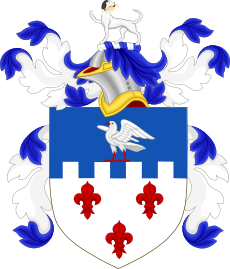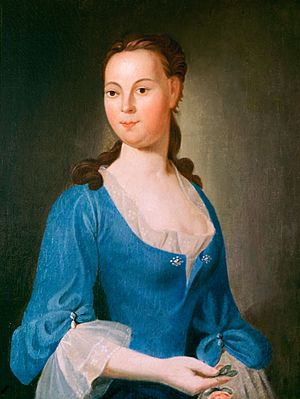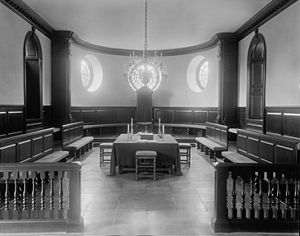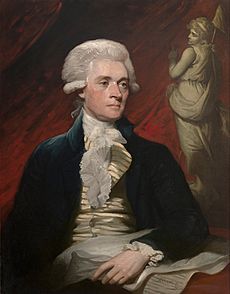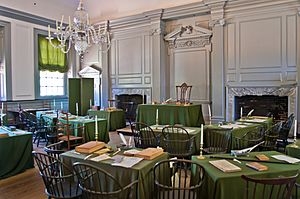George Mason facts for kids
Quick facts for kids
George Mason
|
|
|---|---|
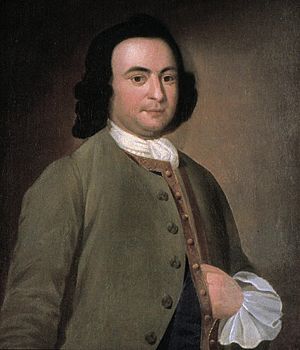
Copy of a 1750 portrait
|
|
| Member of the Virginia House of Burgesses representing Fairfax County | |
| In office 1758–1761 Serving with George Johnson
|
|
| Preceded by | George William Fairfax |
| Succeeded by | John West |
| Member of the Third, Fourth, Fifth Virginia Conventions representing Fairfax County | |
| In office July 17, 1775 – July 5, 1776 Serving with Charles Broadwater, John West Jr.
|
|
| Member of the Virginia House of Delegates representing Fairfax County | |
| In office October 7, 1776 – May 6, 1781 Serving with John West Jr., Philip Alexander, John Parke Custis
|
|
| Succeeded by | Benjamin Dulaney |
| Member of the Virginia House of Delegates representing Fairfax County | |
| In office October 16, 1786 – June 22, 1788 Serving with David Stuart
|
|
| Preceded by | Charles Simms |
| Succeeded by | Roger West |
| Member of the Virginia Ratification Convention representing Stafford County | |
| In office June 2, 1788 – June 27, 1788 Serving with Andrew Buchanan
|
|
| Personal details | |
| Born | December 11, 1725 Likely present-day Fairfax County, Virginia, British America |
| Died | October 7, 1792 (aged 66) Gunston Hall plantation, Fairfax County, Virginia, U.S. |
| Resting place | Mason Family Cemetery, Lorton, Virginia 38°40′07″N 77°10′06″W / 38.66862°N 77.16823°W |
| Spouses | Ann Eilbeck Sarah Brent |
| Children |
|
| Parents | George Mason III Ann Stevens Thomson |
| Occupation | Landowner |
| Signature | |
George Mason (December 11, 1725 – October 7, 1792) was an important American Founding Father. He was a landowner and politician from Virginia. He is best known for writing much of the Virginia Declaration of Rights in 1776. This document later helped shape the United States Bill of Rights, which protects many of our freedoms today. Because of his influence, some call him the "father of the Bill of Rights."
Mason also played a key role in the U.S. Constitutional Convention of 1787. However, he was one of only three delegates who refused to sign the Constitution. He believed it needed a bill of rights to protect individual freedoms. His ideas and writings greatly influenced American political thinking.
Mason was born in 1725 in what is now Fairfax County, Virginia. After his father died young, his mother managed their family's large estates. He married in 1750 and built Gunston Hall, his famous home. He lived as a country gentleman, overseeing his lands and workers. He served briefly in the Virginia House of Burgesses and worked with his neighbor, George Washington. As problems grew between Great Britain and the American colonies, Mason supported the colonists. He used his knowledge to help the revolutionary cause.
During the American Revolutionary War, Mason was a powerful member of Virginia's government. He refused to serve in the Second Continental Congress in Philadelphia, citing health and family reasons. In 1787, he went to the Constitutional Convention. Many parts of the Constitution show his ideas. But he decided not to sign it because it lacked a bill of rights. He also wanted to end the Atlantic slave trade and require a special majority vote for shipping laws. His fight for a bill of rights led James Madison to introduce the amendments that became the Bill of Rights. Mason died in 1792, a year after the Bill of Rights was ratified.
Contents
- Early Life and Family History
- Life as a Virginia Gentleman
- Political Ideas and the Road to Revolution (1758–1775)
- Wartime Service (1776–1781)
- Years of Peace (1781–1786)
- The Constitutional Convention (1787)
- The Fight Over Ratification
- Final Years and Legacy
- Views on Slavery
- Places and Recognition
- Historical Importance
- See also
Early Life and Family History
George Mason's family had been in Virginia for a long time. His great-grandfather, George Mason I, came to the colonies in the 1640s. He was a "Cavalier" who had been defeated in the English Civil War. He settled in what is now Stafford County, Virginia. He received land for bringing his family and servants to the colony.
His grandfather, George Mason II, was the first to move to what became Fairfax County. This area was then the edge of English settlement. George Mason III, like his father and grandfather, served in the Virginia House of Burgesses. George Mason IV's mother, Ann Thomson Mason, was the daughter of a former Attorney General of Virginia.
In colonial Virginia, there were few roads. Most trade happened by boat on rivers like the Potomac and Rappahannock. Large landowners like the Masons controlled local politics. The main crop was tobacco, grown mostly for export to Britain.
George Mason was born into this world on December 11, 1725. His father, George Mason III, died in 1735 when his boat overturned. George was only 10 years old. His mother, Ann, raised him and his two younger siblings. She managed the family lands until George turned 21. At that age, Mason inherited a large estate. This included thousands of acres of farmland in Virginia and Maryland. He also inherited about 300 enslaved people.
Mason began his education at home. He later studied with tutors. He also had access to his uncle John Mercer's large library. This helped him learn a lot. Mason became an adult in 1746. He continued to live with his family at their plantation.
Life as a Virginia Gentleman
Public Service and Community Role
As one of the biggest landowners, Mason took on many important roles. In 1747, he became a judge in the Fairfax County Court. He also served as a church leader (vestryman) for Truro Parish from 1749 to 1785. He joined the county militia and eventually became a colonel. In 1758, he was elected to the Virginia House of Burgesses.
The county court handled legal cases and local taxes. Mason was a judge for most of his life. However, he often didn't attend court because of poor health. He also lived far from the courthouse.
Mason had interests in new towns like Alexandria. He bought land there and became a town trustee in 1754. He also had business in Dumfries and Georgetown.
Building Gunston Hall
On April 4, 1750, Mason married Ann Eilbeck. She was the only child of a wealthy family from Maryland. George and Ann Mason had nine children who lived to adulthood. Their marriage was a happy one. Ann Mason died in 1773.
Mason started building his home, Gunston Hall, around 1755. The house looked like other local buildings of that time. Mason was very proud of the gardens around the house. The estate also had other buildings, like slave quarters and a schoolhouse. It was mostly self-sufficient.
Mason did not rely only on tobacco for money. He leased some of his land to tenant farmers. He also grew other crops like wheat to sell to the British West Indies. This helped him when tobacco prices dropped. Mason was also one of the first in Virginia to try growing wine grapes.
Mason worked to expand his land and wealth. He made the Gunston Hall estate much larger. He was also involved in the Ohio Company for most of his life. This company wanted to survey land near the Ohio River. Although the company failed, Mason gained a lot of western land on his own. His writings defending his land claims also supported the rights of Americans against royal orders.
Friendship with George Washington
Being involved with the Ohio Company brought Mason into contact with many important Virginians, including his neighbor, George Washington. Mason and Washington were friends for many years. However, their friendship ended when they disagreed about the new federal constitution.
Washington respected Mason's intelligence. He often asked for Mason's advice. In 1777, Washington wrote that he knew "no person better qualified" than Mason to handle important issues.
Mason believed that growing too much tobacco would lower its price. He also saw that more and more money was tied up in land and enslaved people. So, even though he owned many enslaved people, he spoke out against the system of slavery in Virginia. He worried that the growing enslaved population would cause future problems.
Political Ideas and the Road to Revolution (1758–1775)
From Lawmaker to Rebel Leader
We don't know much about Mason's political views before the 1760s. That's when he started to oppose British policies in the colonies. In 1758, Mason was elected to the Virginia House of Burgesses. His brother Thomson and George Washington were also elected.
Mason was appointed to important committees in the House of Burgesses. He worked on local issues, like taxes for a tobacco wharf. He also helped divide Prince William County to create Fauquier County. Mason did not seek re-election in 1761, partly because he often missed sessions.
After the British won the French and Indian War, King George III felt the colonies weren't paying enough taxes. The Stamp Act of 1765 required special stamps on legal and trade papers. This affected all 13 colonies. The House of Burgesses passed the Virginia Resolves, saying Virginians had the same rights as people in Britain. They argued that only their elected representatives could tax them. Patrick Henry wrote most of these Resolves.
Mason slowly became more involved in Virginia politics. He opposed the Stamp Act. He even drafted a plan to allow court actions without using stamped paper. This helped lead to a boycott of the stamps. The British Parliament repealed the Stamp Act in 1766. But they still claimed the right to tax the colonies.
In 1767, the Townshend Acts placed duties on goods like lead and glass. This led to calls for a boycott of British goods. Virginia was less eager for a boycott because it relied on British imports. In 1769, Washington asked Mason for advice on what Virginia should do. Mason helped draft a non-importation agreement. This agreement was passed by the Burgesses after the governor dissolved the legislature.
In March 1773, Mason's wife, Ann, died. He was left to raise nine children. This made him even more hesitant to take on political roles that would take him away from Gunston Hall.
In May 1774, news arrived about the Intolerable Acts. These were laws passed by Britain after the Boston Tea Party. Mason joined other lawmakers to plan a response. The Burgesses called for a day of fasting and prayer. The governor dissolved the legislature again.
New elections were held. Washington wanted Mason to run for a delegate to the convention. Mason declined, but he helped draft the Fairfax Resolves. These resolutions protested loyalty to the British Crown but denied Parliament's right to make laws for the colonies. The Resolves called for a continental congress. They also threatened to stop exports if the colonists' demands were not met. The people of Fairfax County approved the Resolves.
Mason spent much of 1774 and 1775 organizing a militia. He believed that all men were "by nature born equally free and independent." This idea would later appear in the Virginia Declaration of Rights.
When Washington became commander of the Continental Army, Mason was elected to the Fourth Virginia Convention. He tried to avoid it due to poor health and family duties. But he was elected anyway. Mason was assigned to important committees, including one to raise an army. He also sponsored a non-exportation measure. He refused to be elected to the Continental Congress. But he could not avoid being elected to the powerful Committee of Safety.
The Virginia Declaration of Rights
Mason was often ill in 1775. He did not attend the Fourth Virginia Convention. By May 1776, many Virginians agreed that independence from Britain was necessary. The Fifth Virginia Convention met in Williamsburg to decide how Virginia would be governed. Mason was elected for Fairfax County, though it was difficult.
The convention instructed Virginia's delegates in Congress to seek "a clear and full Declaration of Independency." They also decided to create a declaration of rights. Mason arrived late due to illness, but he was appointed to the committee to write these documents.
Mason worked in a room at the Raleigh Tavern. He drafted a declaration of rights and a plan for government. His draft "swallowed up all the rest," as one person recalled. The Virginia Declaration of Rights and the 1776 Constitution of Virginia were joint efforts, but Mason was the main author. His draft drew on important English documents like the Magna Carta.
Mason's first article stated the rights of man. From this, he explained that government's job is to protect these rights. If it fails, the people have the right to change or abolish it. Property could not be taken without the owner's consent. Accused people had the right to a speedy trial.
When the convention discussed the declaration, some worried that the first sentence would imply that enslaved people were equal to their masters. They added words to exclude enslaved people. Mason spoke often during the five days of debate. The Declaration of Rights was passed on June 12, 1776.
Later, there were debates about who wrote which parts. Mason had written about religious tolerance, but James Madison insisted on full religious liberty. Mason supported Madison's change.
Mason's words, "all men are born equally free and independent," were later used in many state constitutions. Thomas Jefferson used similar ideas in the Declaration of Independence. Mason wrote in 1778 that the Declaration of Rights "was closely imitated by the other United States." This was true, as many states created their own bills of rights.
Creating Virginia's Constitution
Even before the Declaration of Rights was approved, Mason worked on a constitution for Virginia. Jefferson also sent several versions from Philadelphia. Mason's plan was submitted between June 8 and 10, 1776. It named the new state the "Commonwealth of Virginia," showing that power came from the people.
The constitution created a popularly elected House of Delegates. This body held most of the government's power. The governor could not veto bills and acted as head of the militia only with advice from his council. The committee discussed the draft and included Jefferson's preamble. The entire convention approved the document on June 29.
Patrick Henry became Virginia's first governor after independence. Mason led the committee that informed Henry of his election. Some criticized the constitution for not having an amending process and giving two delegates to each county regardless of population. However, the 1776 constitution remained in effect until 1830. Historians agree that Mason was the main creator of this important document.
Wartime Service (1776–1781)
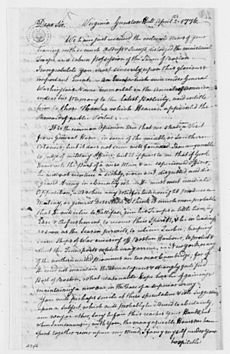
During the American Revolutionary War, Mason worked hard to protect Fairfax County and Virginia's rivers. The British often raided areas along the Potomac River. Controlling the rivers and Chesapeake Bay was important for Virginians to trade tobacco for money. This trade allowed them to get British-made goods like cloth and medicine from France and Holland.
Mason served in the House of Delegates from 1776 to 1781. This was his longest time in political office outside Fairfax County. He represented Fairfax County throughout the war. However, Mason's health often made him miss legislative meetings or arrive late.
In 1777, Mason was asked to help revise Virginia's laws. He resigned after a few months, saying he was not a lawyer. Most of this work fell to Jefferson. Mason's illness also caused him to miss part of the spring 1777 session. During his absence, delegates elected him to the Continental Congress. Mason refused, saying he was needed at home.
Virginians still wanted Mason in the Continental Congress. In 1779, Richard Henry Lee hoped Mason, George Wythe, or Jefferson would replace him. General Washington was frustrated that many talented men refused to serve in Congress.
Despite Washington's requests, Mason stayed in Virginia. He was often ill and busy defending the Fairfax County area. Most of the laws Mason introduced in the House of Delegates were related to the war. They aimed to raise men or money for Washington's army.
Paper money lost value quickly. Mason developed a plan to redeem the notes with a tax on real estate. Washington had faith in Mason's financial knowledge and wished he could attend.
Mason remained interested in western lands. He and Jefferson were told about George Rogers Clark's expedition to secure lands north of the Ohio River. Mason and Jefferson helped pass laws to defend against western enemies. Mason also worked to resolve differences between Virginia and other states. In 1780, Mason remarried to Sarah Brent. This marriage helped share the burden of raising his many children.
Years of Peace (1781–1786)
After the 1783 Treaty of Paris ended the war, life along the Potomac returned to normal. James Madison visited Gunston Hall in December 1783. He was looking for a stronger federal government. Mason was open to the idea of a federal tax. Mason also spent Christmas at Mount Vernon with George Washington. A guest described Mason as "slight in figure, but not tall, and has a grand head and clear gray eyes."
Mason refused to be elected to the House of Delegates in 1784. He said it would be "an oppressive and unjust invasion of my personal liberty." However, he was appointed to negotiate with Maryland about navigation on the Potomac River. Mason worked hard on this issue. He reached an agreement with Maryland delegates at the Mount Vernon Conference in March 1785. This meeting was later seen as a step toward the 1787 Constitutional Convention.
Mason was also appointed to the Annapolis Convention of 1786. This meeting called for a conference to amend the Articles of Confederation.
To stop smuggling, Madison proposed a law to make Norfolk the state's only legal port. Other ports, including Alexandria, were added later. Mason opposed this Port Act. He accepted election to the House of Delegates in 1786. Many believed his influence would help repeal the act. Mason did not attend the initial session due to illness. But he sent a petition against the act. The Port Act remained, though more ports were added.
The Constitutional Convention (1787)
Helping Build a New Government
The Annapolis Convention led to a meeting in Philadelphia in May 1787. Its goal was to amend the Articles of Confederation to create a stronger government. In December 1786, the Virginia General Assembly chose seven delegates, including Washington, Mason, and Madison. Mason accepted the appointment without hesitation.
The trip to Philadelphia was Mason's first outside Virginia and Maryland. Virginia's leaders chose him because they saw him as wise and trustworthy. Mason likely went because he knew the federal government needed more power. He also felt it could check the power of state legislatures.
Before the convention officially opened, the Virginia delegates met daily. They developed what became known as the Virginia Plan. Mason was impressed by the quality of the delegates. He felt that the "hopes of all the Union centre in this Convention." He wrote to his son that forming the new government was a bigger task than revolting from Britain.
Mason knew few delegates from outside Virginia or Maryland. But his reputation was well known. The convention held closed sessions at the Pennsylvania State House. Washington was elected president of the convention. Mason spoke often, as frequently as only four or five other delegates. Even though he didn't sign the Constitution, he won many debates.
In the early days, Mason supported much of the Virginia Plan. This plan proposed a federal legislature with representation based on population. Mason agreed that the federal government needed to be stronger than the states.
Smaller states did not like the Virginia Plan because it favored larger states. The New Jersey Plan proposed equal votes for each state. The convention became stuck. On July 2, a committee was formed to find a solution. Mason was appointed to this committee. The committee proposed the Great Compromise: a House of Representatives based on population and a Senate with equal representation for each state. Mason likely influenced the rule that money bills must start in the House.
Growing Doubts and Refusal to Sign
By mid-July, Mason had a lot of influence at the convention. He successfully argued that the minimum age for serving in Congress should be 25. He also proposed that the national capital should not be in a state capital.
On August 6, the convention received a draft from a committee. Mason found the draft acceptable for discussion. However, he felt the Senate was too powerful. It could make treaties and appoint Supreme Court justices. He also wanted a "council of revision" to review laws.
The convention spent weeks debating Congress's powers. Mason succeeded in some proposals, like putting state militias under federal control. He also got a ban on Congress passing an export tax. But he lost on crucial issues. The convention decided to allow the importation of enslaved people to continue until at least 1808. They also allowed a simple majority vote for navigation acts. These acts could force Virginians to use American ships for tobacco exports, even if foreign ships were cheaper.
On August 31, Elbridge Gerry and Luther Martin spoke against the document. Mason seconded Gerry's motion to postpone considering the final document. He said he "would sooner chop off his right hand than put it to the Constitution as it now stands." However, he still considered signing it if certain issues were resolved.
Mason's concerns grew on September 12. Gerry proposed, and Mason seconded, that a committee write a bill of rights to be part of the Constitution. Roger Sherman argued that state bills of rights would remain in force. Mason replied that federal laws would be supreme over state bills of rights. The motion failed, with no states in favor. On September 15, Mason, Edmund Randolph, and Gerry stated they would not sign the Constitution.
On September 17, members from twelve states signed the Constitution. Only Mason, Randolph, and Gerry refused. Mason sent his objections to Richard Henry Lee, a member of Congress.
The Fight Over Ratification
Mason returned to Virginia "in an exceeding ill humor." He believed the convention had rushed its work. Mason was injured in an accident on the road. News of his opposition reached Fairfax County before he did. Most people there supported the Constitution. Washington urged ratification, believing the choice was between ratification and disaster.
The Constitution needed nine states to approve it to become law. Opposition from large states like New York or Virginia would make it hard for the new government to work. Mason remained in the House of Delegates. In October 1787, the legislature called a convention for June 1788 to discuss the Constitution.
Mason's "Objections to this Constitution of Government" was published in October 1787, without his permission. It was widely used by those who opposed the Constitution. Mason believed that with proper amendments, the Constitution could be a good government. His "Objections" were very influential. Its opening line, "There is no Declaration of Rights," became a powerful slogan for opponents.
Many Virginians found it hard to believe that respected figures like Washington and Franklin would support a tyrannical system. Mason faced criticism. Some accused him of not doing much for his country during the war.
Mason had trouble winning election to the ratifying convention from Fairfax County. Most people there supported the Constitution. So, he sought election in Stafford County, where he owned property. He assured voters he did not want disunion, but rather reform. He spoke strongly against the unamended Constitution. On March 10, 1788, Mason won the most votes in Stafford County.
When the Richmond convention opened in June, Edmund Randolph had switched sides and now supported the Constitution. This hurt the efforts of Mason and Patrick Henry. Mason moved that the convention discuss the document clause by clause. Henry led the opposition to a strong federal government. Mason spoke several times, discussing issues like the president's power to pardon and the federal court system. He warned that federal courts could lead to lawsuits between citizens and states.
The Federalists did not have a clear majority at first. The vote depended on delegates from western Virginia (now Kentucky). The Anti-Federalists faced setbacks as news came that other states had ratified the Constitution. Mason led a group that drafted amendments. Even Federalists were open to supporting them, but they wanted the Constitution ratified first.
After some delegates from Kentucky decided to support ratification, the convention voted on a resolution to delay ratification until a bill of rights was approved. Mason supported this, but Madison and others opposed it. The resolution failed. Mason then voted with the minority as Virginia ratified the Constitution on June 25, 1788, by a vote of 89–79. After the vote, Mason helped create a final list of recommended amendments.
Final Years and Legacy
After his defeat in Richmond, Mason returned to Gunston Hall. He focused on his family, local affairs, and his health. He still wrote letters to political leaders. He resigned from the Fairfax County Court because a new law required officeholders to support the Constitution. In 1790, he declined a seat in the Senate, saying his health would not allow him to serve.
Mason's views on the new federal government softened over time. He wrote that he would "cheerfully put my Hand & Heart to the new Government" if his concerns about federal courts and other matters were addressed. He was pleased with what became the United States Bill of Rights, ratified in 1791.
Washington, who became the first president in 1789, resented Mason's strong opposition to the Constitution. Their differences ended their friendship. Mason always wrote positively about Washington. But Washington privately called Mason a "quondam friend" (former friend) who would not admit his errors.
Mason died at Gunston Hall on October 7, 1792. He was buried on his estate. His death received little notice at the time. However, Jefferson mourned "a great loss." James Monroe said that Mason's "patriotic virtues thro[ugh] the revolution will ever be remembered."
Views on Slavery
George Mason often spoke out against slavery, even before America became independent. In 1773, he wrote that slavery was a "slow Poison" that harmed people's minds and morals. In 1774, he supported ending the international slave trade.
However, Mason himself owned many enslaved people. In Fairfax County, only George Washington owned more. Mason is not known to have freed any enslaved people, even in his will. His will divided his enslaved people among his children. Historians have different views on why Mason, who spoke against slavery, did not free his own enslaved people. Some believe he felt he had no choice, as it might hurt his children's financial future.
Virginia banned the importation of enslaved people from other countries in 1778, while Mason was in the House of Delegates. In 1782, Virginia passed a law allowing adult enslaved people to be freed if they were young enough to support themselves. However, a proposal to require freed enslaved people to leave Virginia was defeated.
Mason's views on slavery are complex. He wanted protection for slave property, but he also opposed the slave trade. He stated that slavery was "far from being a desirable property. But it will involve us in great difficulties and infelicity to be now deprived of them."
Places and Recognition
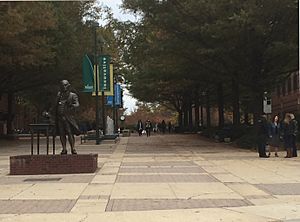
There are several places that remember George Mason in Fairfax County. Gunston Hall is now a museum "dedicated to the study of George Mason, his home and garden, and life in 18th-century Virginia." George Mason University, near the city of Fairfax, was named after him in 1972. A statue of George Mason stands on the campus, showing him presenting his first draft of the Virginia Declaration of Rights.
The George Mason Memorial Bridge connects Northern Virginia to Washington, D.C. The George Mason Memorial in West Potomac Park in Washington, D.C., also has a statue of Mason. It was dedicated on April 9, 2002.
Mason was honored in 1981 with an 18-cent postage stamp by the United States Postal Service. A bas-relief (a type of sculpture) of Mason is in the Chamber of the U.S. House of Representatives. It is one of 23 honoring great lawmakers. Mason and Jefferson are the only Americans recognized there.
Historical Importance
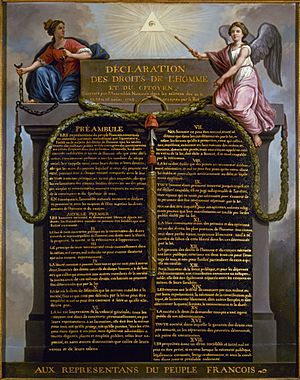
Mason's work on the Virginia Declaration of Rights was very important. It was the first of many new constitutions in the American colonies. These documents stated that political power comes from the people. They also listed the individual rights of citizens, which governments must protect. Mason wrote the first of these lists. He made the declaration of rights his "personal crusade."
Mason is celebrated as a champion of constitutional order and one of the fathers of the Bill of Rights. Justice Sandra Day O'Connor said that Mason's greatest contribution was his influence on our Bill of Rights.
Mason's ideas also spread overseas. Even though he never visited Europe, his ideals did. Lafayette's "Declaration of the Rights of Man and of the Citizen" during the French Revolution was influenced by Jefferson. Historians note a strong similarity between the French Declaration and the Virginia Declaration of 1776.
Mason's role became less known in the century after his death. He was older than many who became famous with the new federal government. He died soon after the Constitution began. He also did not seek federal office. Mason did not leave many personal papers, unlike Washington or John Adams. He also fought on the losing side at the Constitutional Convention and in Virginia.
However, Mason's importance has grown in the 20th and 21st centuries. His role in creating important American liberty documents is now clearer. Mason's "Objections" helped force James Madison to introduce the Bill of Rights. His ideals and political actions have greatly influenced our constitutional law.
See also
 In Spanish: George Mason para niños
In Spanish: George Mason para niños
 | Ernest Everett Just |
 | Mary Jackson |
 | Emmett Chappelle |
 | Marie Maynard Daly |


